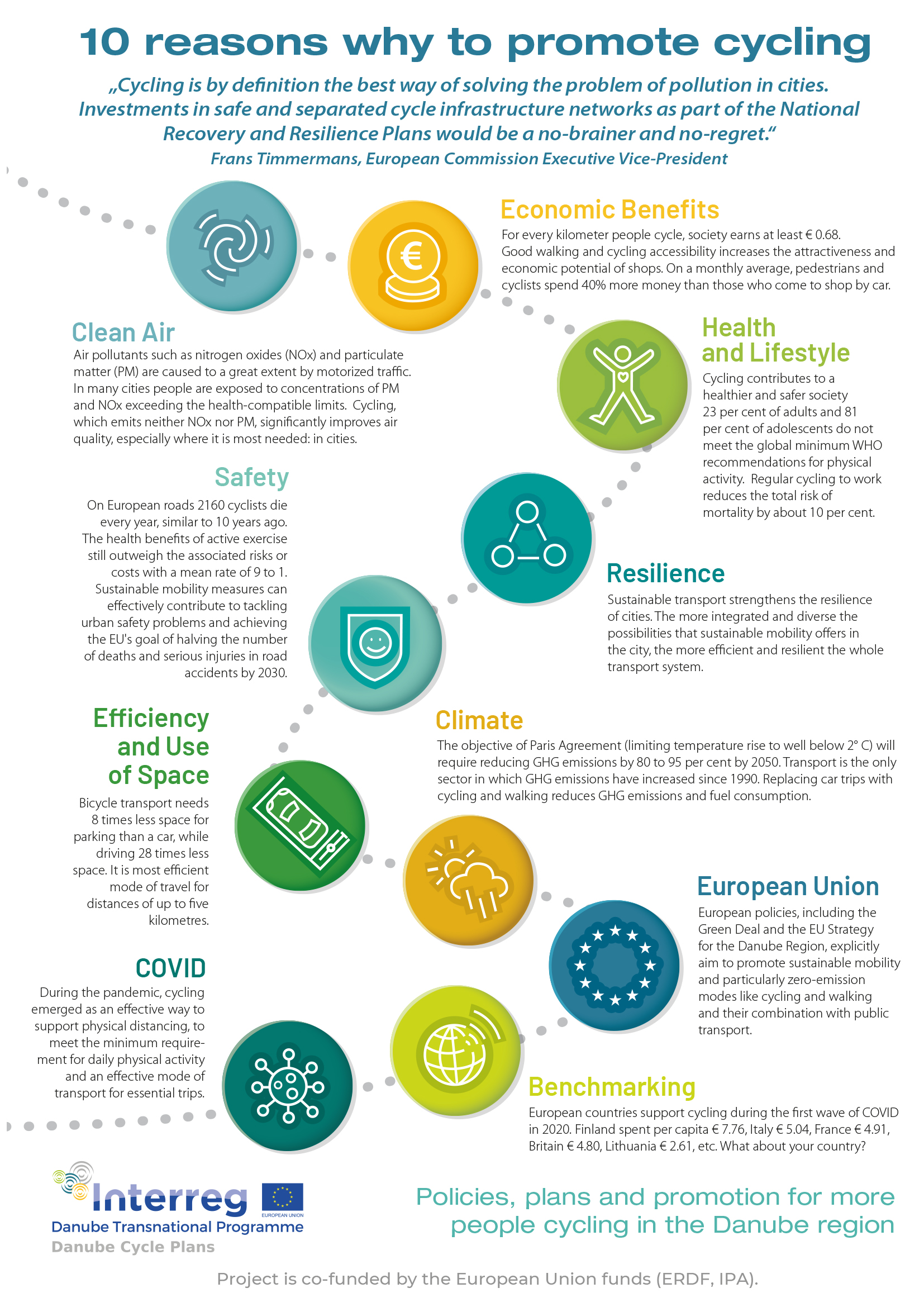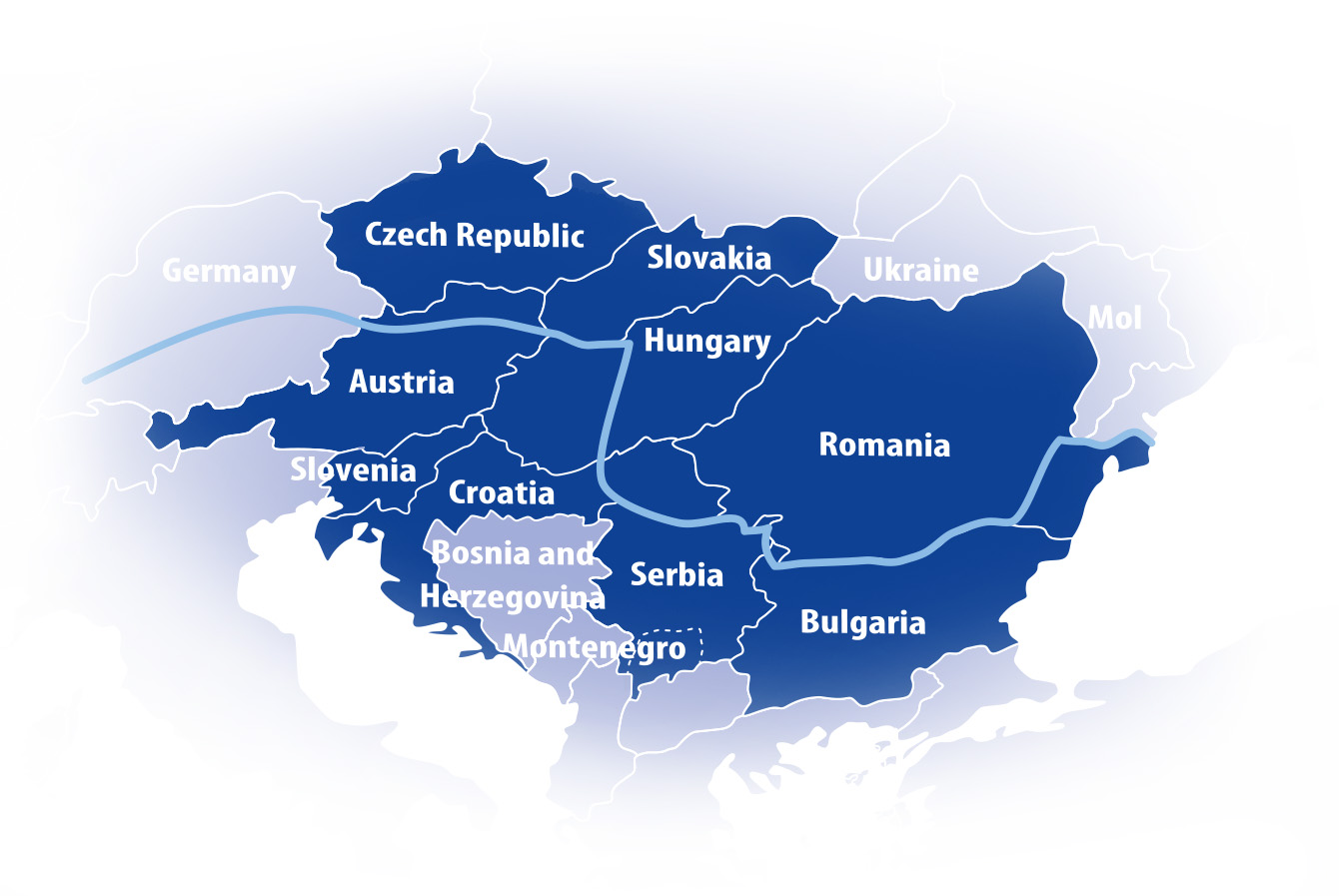|
|
| |
|
Dear partners,
We hope that you have dedicated the last days of 2020 to yourself and your loved ones and took the opportunity to relax and recharge your batteries. To be on the safe side, we are once again sending information about new features in the Danube Cycle Plans project, which is taking place within the Danube Transnational Program.
In this newsletter, you will find several results that were successfully finalized in the last period. Although we had limited travel opportunities, we took full advantage of the opportunity to meet through many online conferences and discuss issues of the transnational Danube Cycling Strategy.
The Danube Cycle Plans project aims at improving the framework conditions for cyclists resulting in more people cycling in the Danube region. The project covers nine European countries and is managed by the Environment Agency Austria.
The ongoing pandemic shows us, that cycling is definitely becoming increasingly popular and will be even more relevant in the future. To prove this, we can give you the growing number of people who used a bike during the pandemic in Vienna: this number has increased by 20 %. It is hardly a wonder, since individual transportation may prevent contagion.
In case you want to learn more about the Danube Cycle Plans projects or about interesting news concerning cycling, please keep on reading the newsletter below.
Check the Danube Cycle Plans project webpage for timely updates
or subscribe to our newsletter.
|
| |
 |
HOW TO DEFINE CYCLE ROUTE NETWORKS?
|
|
The provision of adequate cycling infrastructure is one of the most efficient ways to promote cycling. For the development of the Danube Cycle Route Network, it is necessary to identify and define the relevant network sections in every participating country together with defining infrastructure standards and investment plans considering current infrastructure condition.
On November 26, representatives from 9 countries joined the 1st thematic workshop of the Danube Cycle Plans project to discuss guidelines about the definition of national cycle route networks as parts of a harmonized Danube cycle route network. The guidelines will build upon the recommendations of the infrastructure module in the Pan-European Master Plan for Cycling Promotion, developed under the Transport, Health and Environment Pan-European Programme (THE PEP).
The final version of the Danube Cycle Plan‘s guidelines to define cycle route networks is expected to be finalized by the end of January.
For details
>> CLICK HERE <<
|
|
|

| |
 |
DANUBE CYCLE PLANS - CALL TO ACTION
|
|
The consortium of partners from nine European countries cooperating in the Danube Cycle Plans project calls you to action. Use this unique opportunity and include necessary investments in the promotion of cycling into your National Recovery and Resilience Plan, as well as in programmes of the multiannual financial framework for 2021–2027.
Please read our brief
‘10 reasons why to promote cycling’ … and act.
For details
>> CLICK HERE <<

|
|
| |
 |
LET US INTRODUCE OURSELVES - THE DANUBE CYCLING AMBASSADORS
|
 |
|
„I know many people just overlook the matter of cycling, but I find it to be one of the weakest links in our strategies and concepts. That's why I've decided to support the joint call of the Danube Cycle Plans project. If there are more of us, we could change things.“
Jaroslav Vymazal
Member of the CR Parliament and Councilor of the City of Jihlava
|
|
| |
 |
kick-off CONFERENCE OPENED THE DISCUSSION
|
On September 28, 2020, a kick-off conference was held for the Danube Cycle Plans project, with more than 40 connected participants from ten European countries. The conference was focused on how to raise awareness for cycling as an important mode of everyday travelling and how to incorporate cycling into strategic plans. The event was organised by Environment Agency Austria. Due to the current COVID-19 pandemic, the kick-off conference and partner meeting was held as a virtual event.
 |
„The Corona pandemic has seen at least two winners in mobility: individual car travel and active mobility, especially cycling. Cycling is resilient, healthy, sustainable, affordable and allows social distancing. Danube Cycle Plans will use this momentum and will bring cycling a huge step forward on the mobility agenda of the participating countries.“
Henriette Spyra
Environment Agency Austria
|
|
| |
 |
DID YOU KNOW, THAT....
|
| |
 |
|
The ongoing pandemic shows us, that cycling is definitely becoming increasingly popular and will be even more relevant in the future. To prove this, we can give you the growing number of people who used bike during the pandemic in Vienna: this number has increased by 20 %. It is hardly a wonder, since individual transportation may prevent contagion.
|
|
| |
 |
DANUBE CYCLE PLANS
|
|
Project duration:
1 July 2020 – 31 December 2022
Budget:
Overall: 1,682,760.75 EUR
ERDF Contribution: 1,291,787.05 EUR
IPA Contribution: 138,559.56 EUR
Programme:
Danube Transnational Programme (Interreg), Call 3
Priority:
Better connected and energy responsible Danube region.
Specific objective:
Support environmentally friendly and safe transport systems and balanced accessibility of urban and rural areas.
dtp.interreg-danube.eu/danube-cycle-plans

Photo: © Martina Moncekova, © pxhere, © lofilolo / Depositphoto, © Radovan Danek / Jihlava City © Environment Agency Austria
|
|
|
|
|
| |
|
If you have received this newsletter, you have been included on one or more of the Danube Transnational Programme/projects postal mailing lists. We are committed to respect and protect the privacy of personal data collected. We regard your personal data as confidential information and will never communicate it to third parties. Your personal data are used mainly for the express purpose of receiving the newsletter. Your mailing details may also be used by the DTP and its projects for information and dissemination purposes strictly related to the programme and its projects. If you prefer not to receive more of this newsletter and your data not to be used for dissemination purposes, you can unsubscribe by sending a reply email.
|
|
|
|
|
|
